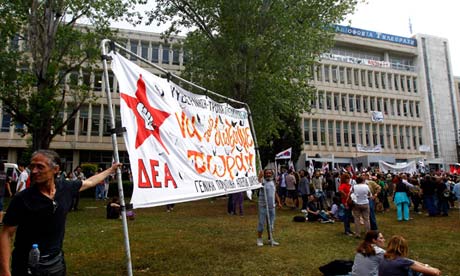 Greece's fragile coalition government is in disarray after the prime minister tipped the country into an unexpected crisis following a decision to shut down the state broadcaster with immediate effect to meet bailout austerity measures.
Greece's fragile coalition government is in disarray after the prime minister tipped the country into an unexpected crisis following a decision to shut down the state broadcaster with immediate effect to meet bailout austerity measures.The draconian move on Tuesday night, designed to prove that the government was serious about tackling the bloated public sector, has left the Greek public in shock, leaving 2,700 unemployed and prompting two general strikes planned for Thursday.
Thousands of protesters gathering overnight outside ERT's headquarters in Athens and journalists inside defied government orders to stop operations, occupying the building and keeping a makeshift news service going on the internet. "This is a blow to democracy," said ERT newsreader Antonis Alafogiorgos at the end of the main TV station's final broadcast on Tuesday night.
By Wednesday night, an estimated 5,000 people had gathered in solidarity, with the broadcaster's orchestra performing inside being relayed outdoors through loudspeakers. The decision threatened to bring down conservative-led coalition government, which cited the broadcaster's "incredible waste" of money for the closure.
Leaders of the junior partners in the coalitions Evangelos Venizelos (Pasok) and Fotis Kouvelis (Democratic Left), condemned the move while the leader of the opposition described it as a "coup".
The prime minister, Antonis Samaras, showed no sign of succumbing to the growing national and international pressure to reverse his decision describing the move as temporary and promising to open a new station at the end of August with a slimmed down operation of 1,200 staff.
The European Broadcasting Union (EBU), which represents Europe's public service broadcasters, expressed "profound dismay" in a letter to Samaras, urging him to think again.
"This is completely anti-democratic. You could understand it if they were bankrupt but they are not. It is also unprofessional. Why issue this decree today? If they had plans for a new broadcaster, why not plan for a seamless handover," said EBU director general, Ingrid Deltenre.
It has set up an emergency working party to find ways of keeping ERT on air and set up a satellite broadcast operation in the car park outside ERT to enable journalists using equipment yet to be confiscated to continue to broadcast.
Inside the occupied building, Anastasia Zigou, a presenter said: "Many of us haven't slept for 48 hours, but we won't give in. We are sustained by the huge response we've had from citizens, not only here but at local radio stations all over the country.
"There have been people in tears at local radio stations in border regions – in Crete, in Samos, in Thrace. In those areas, ERT was the only Greek language radio you could hear, and the signals of other TV stations are weak too," she added.
"Without ERT they feel cut off from the metropolis. But it's much more than that, more than the firing of 2,600 workers. The sudden, undemocratic closure of a public broadcaster was a kind of coup. This isn't a private station that someone can just decided to close. This doesn't happen in democratic countries."
The surprise closure of the broadcaster is one of the biggest crises to hit the three-party coalition government since it was formed nearly a year ago.
Opposition leader Alexis Tsipras met the Greek president Karolos Papoulias on Wednesday afternoon, and condemned the move as an "institutional coup".
"Many times the word 'coup' is used as an exaggeration," he said. "In this case, it is not an exaggeration."
The government said it tried in vain to negotiate a new deal with unions representing ERT staff with a voluntary redundancy and early retirement scheme and had no other choice but to close the station.
Deltenre said it was seeking urgent talks with the Greek government and had set up a technical working group to provide emergency assistance to ERT in the event the police were ordered to clear the headquarters. It said it can open a makeshift studio downtown but would not have the funds to cover staff overheads.
She said the situation as "unprecedented" and said even the East Germans weren't as abrupt when the cold war ended and kept their own service on air as part of the transition to reunification of the country.
Deltenre also condemned the troika, including the EU commissioner for economics and monetary affairs, Olli Rehn, who told the Strasbourg parliament that the EU had not requested the closure as part of the bailout.
However, as part of the bailout programme, the government agreed with the troika to pass legislation by mid-August to make cuts in "non-essential public entities" including "asset management companies; construction companies; and public television stations".
Deltenre said: "In every country where the troika have turned up, the public service broadcasters have been put under enormous pressure … they push governments to something and the result is wrong," she said.
ERT, which launched in the 1930s, is largely state-funded, with every Greek household paying a €51 (£43) fee through its electricity bills. Though it was widely regarded as reflecting government positions – it had a channel run by the military during the 1967-74 dictatorship – the broadcaster was also valued for showcasing regional and cultural content and for covering major sporting events such as the football World Cup and the Olympics.
Debt-stifled Greece has depended on rescue loans since May 2010. In exchange, it has imposed deeply resented income cuts and tax increases, which exacerbated a crippling recession and forced tens of thousands of businesses to close, sending unemployment to a record of 27%.
Original Article
Source: guardian.co.uk
Author: Lisa O'Carroll
No comments:
Post a Comment